Tom Kepler's Blog, page 39
November 1, 2011
Book Review: Treadwell, a Novel of Alaska Territory
[image error]
Leonard "Stoney" Compton, author of Treadwell, a Novel of Alaska Territory, it seems to me, decided to choose an interesting place to set a story, to choose interesting, dynamic characters and challenge them with complex conflicts, and then chose to research an era of a hundred years ago to accurately describe the milieu. The result of his choices is a highly readable, entertaining story about the Alaska Territory in 1915, complete with romance, skulking imperialists, murderers, Pinkerton detectives, and diverse inclusions of the different cultures that populated the northern frontier.
I was continually surprised as I read the novel--the depth and diversity of character development was unexpected and quite a treat. The detail in which the frontier towns of Alaska were described was not only entertaining but also informative. I actually asked myself the question: "Why am I so surprised and delighted?" The answer was an interesting one.
Both before and after reading Treadwell, I was reading authors who wrote around 1915--western romance writer Zane Grey and young adult action novelist Joseph Altsheler. Altsheler's novels were his The Guns of Europe trilogy. What I realized after reading Compton's Treadwell historical novel was that one hundred years of historical perspective can add a great deal to a writer's toolbox. Compton develops characters of the Filipino, Native American, and various immigrant cultures with compassion and understanding that is possible because of the hundred years of experience time has provided. Women are characterized with more realism and sensitivity--especially two sisters in the novel, Florence and Fiona, who act as foils for the women's issues of the times. Loss of culture, changing cultures, and immigration to new cultures are significant to the novel. Key minor characters to the action of the story are members of racial and ethnic minorities, which allows for a richer experience of the times.
In an way, the Alaska Territory is an important "character" in the novel because of the significant interaction and influence it has with the human characters. And the basic story? A Pinkerton detective arrives in Alaska to solve a murder. While doing so, he falls in love with both a woman and the land--and becomes embroiled in World War I politics and German saboteur intrigues to keep the United States either out of the war or to weaken its ability to go to war. How can this be done in Alaska? The answer is gold.
The novel has some weaknesses. A short background chapter on gold mining is written in present tense, which is a contrast to the past tense explication of the novel's action. Some of the prefatory material for the chapters (mostly historical artifacts) is overlong, but that is easily remedied by just skipping the reading and getting on with the story. I didn't do this until the suspense built at the end of the novel. Then I just skipped to the action. (We've all done this, haven't we?) Some proofreading errors exist, but they were far enough apart that I was able to enjoy the development of the story.
I know that one of my major complaints about reading some writers of the turn of the century, such as Zane Grey and Joseph Altsheler, is that I am uncomfortable with the racial, ethnic, gender, and ideological perspectives of the time. I don't want Hispanics dismissively stereotyped, or a woman characterized as being strong, considering she's a woman, or entire races or cultures mentioned but never explored or celebrated. After reading Alsheler's trilogy of the beginning of World War I, the idea that war is bad was evident in his writing--and I appreciated that--but as a writer, it was evident that the man had no desire to create that ugliness with his words. Therefore, war didn't seem so bad; after all, the protagonist lived through it without maiming wounds--and got the girl. How many young men--and now young women--have gone off to a brave, beautiful war and were returned in a body bag or buried far from home or returned as the walking wounded?
Leonard Compton's Treadwell, a Novel of Alaska Territory provided me with the opportunity to have those grating historical perspectives rectified in a novel. I was able to experience the diversity of culture that the frontier attracted. I was able to observe individuals wrestling with the democratic issues of the time: people with a voice instead of imperialism, participatory democracy instead of anarchism, gender equality rather than inequality, racial and ethnic inclusion rather than exclusion. I found this highly satisfying.
Even if only a minority of the population of 1915 could be called socially aware by the standards we hold today, it is highly fulfilling to read their story and to engage in their challenges and triumphs. It might be retro civil rights activism, it might be wishful thinking, but it feels good.
Treadwell, a Novel of Alaska Territory is also available an an ebook through Smashwords.
Copyright 2011 by Thomas L. Kepler, all rights reserved
I was continually surprised as I read the novel--the depth and diversity of character development was unexpected and quite a treat. The detail in which the frontier towns of Alaska were described was not only entertaining but also informative. I actually asked myself the question: "Why am I so surprised and delighted?" The answer was an interesting one.
Both before and after reading Treadwell, I was reading authors who wrote around 1915--western romance writer Zane Grey and young adult action novelist Joseph Altsheler. Altsheler's novels were his The Guns of Europe trilogy. What I realized after reading Compton's Treadwell historical novel was that one hundred years of historical perspective can add a great deal to a writer's toolbox. Compton develops characters of the Filipino, Native American, and various immigrant cultures with compassion and understanding that is possible because of the hundred years of experience time has provided. Women are characterized with more realism and sensitivity--especially two sisters in the novel, Florence and Fiona, who act as foils for the women's issues of the times. Loss of culture, changing cultures, and immigration to new cultures are significant to the novel. Key minor characters to the action of the story are members of racial and ethnic minorities, which allows for a richer experience of the times.
In an way, the Alaska Territory is an important "character" in the novel because of the significant interaction and influence it has with the human characters. And the basic story? A Pinkerton detective arrives in Alaska to solve a murder. While doing so, he falls in love with both a woman and the land--and becomes embroiled in World War I politics and German saboteur intrigues to keep the United States either out of the war or to weaken its ability to go to war. How can this be done in Alaska? The answer is gold.
The novel has some weaknesses. A short background chapter on gold mining is written in present tense, which is a contrast to the past tense explication of the novel's action. Some of the prefatory material for the chapters (mostly historical artifacts) is overlong, but that is easily remedied by just skipping the reading and getting on with the story. I didn't do this until the suspense built at the end of the novel. Then I just skipped to the action. (We've all done this, haven't we?) Some proofreading errors exist, but they were far enough apart that I was able to enjoy the development of the story.
I know that one of my major complaints about reading some writers of the turn of the century, such as Zane Grey and Joseph Altsheler, is that I am uncomfortable with the racial, ethnic, gender, and ideological perspectives of the time. I don't want Hispanics dismissively stereotyped, or a woman characterized as being strong, considering she's a woman, or entire races or cultures mentioned but never explored or celebrated. After reading Alsheler's trilogy of the beginning of World War I, the idea that war is bad was evident in his writing--and I appreciated that--but as a writer, it was evident that the man had no desire to create that ugliness with his words. Therefore, war didn't seem so bad; after all, the protagonist lived through it without maiming wounds--and got the girl. How many young men--and now young women--have gone off to a brave, beautiful war and were returned in a body bag or buried far from home or returned as the walking wounded?
Leonard Compton's Treadwell, a Novel of Alaska Territory provided me with the opportunity to have those grating historical perspectives rectified in a novel. I was able to experience the diversity of culture that the frontier attracted. I was able to observe individuals wrestling with the democratic issues of the time: people with a voice instead of imperialism, participatory democracy instead of anarchism, gender equality rather than inequality, racial and ethnic inclusion rather than exclusion. I found this highly satisfying.
Even if only a minority of the population of 1915 could be called socially aware by the standards we hold today, it is highly fulfilling to read their story and to engage in their challenges and triumphs. It might be retro civil rights activism, it might be wishful thinking, but it feels good.
Treadwell, a Novel of Alaska Territory is also available an an ebook through Smashwords.
Copyright 2011 by Thomas L. Kepler, all rights reserved
Published on November 01, 2011 05:00
October 29, 2011
English Grammar: has it gotten a bum rap on Facebook?

Here's something I commented on at Facebook the other day, and it gave rise to a number of possibilities.
Does that mean English teachers work for the police or for the mob?I pull out a red pencil and say, "All right, give me all your split infinitives, dangling modifiers, and adjectives used as adverbs. And while you're at it, hand over your lack of verb agreement, too!"Mixed metaphors, the "easy grammar" that leads the unsuspecting on to cliche and punning.Certain herbal remedies are good for run-on sentences."I'm just trying to be objective: this is a me, me, me society!" "What! You've lost the antecedent of an indefinite pronoun? Round up the usual suspects!""Johnny, if you are ever indulge in improper subordination again."He was arrested for scattering superfluous commas in a no-punctuation zone on Facebook."Officer, you've got the wrong point of view! I'm not the person you're looking for."Did you hear about the anarchist who wired a bomb in the subjunctive tense? It never went off."Neither a comma splice nor a fused sentence be." --Bill ShakespeareAny you care to share? Leave a message below.
Copyright 2011 by Thomas L. Kepler, all rights reserved
Published on October 29, 2011 05:00
October 27, 2011
Facebook Pages: a change I've noticed
 A year ago when I was sharing the news that my realistic young adult novel, Love Ya Like a Sister, was available, I used the "Update" option in Facebook Pages "Resources" to send a message to all those who followed or "liked" the page.
A year ago when I was sharing the news that my realistic young adult novel, Love Ya Like a Sister, was available, I used the "Update" option in Facebook Pages "Resources" to send a message to all those who followed or "liked" the page.That is no longer possible.
Here is the explanation from Facebook from their "Help" page:
Can I update fans of my page using Facebook Messages?
As of September 30th you'll no longer be able to send an update to fans using Facebook Messages. We want you to connect with your audience in the most effective ways possible, and updates that go to Facebook Messages may end up unseen in the "Other" folder.
Here are other ways you can expand your reach:
Post content on your page Wall so people see your updates in their news feed. You can target your posts by location or language by choosing Customize from the audience selector dropdown before you post.Consider using targeted Facebook Ads or Sponsored Stories to help grow and highlight your message within the Facebook experience.Of course, targeted ads and stories do cost you. So it seems that Facebook has removed the option of messages to fans for free because the message may end up in the "Other" folder for what they consider a more viable option, paying for an ad that posts on the right sidebar of Facebook that your "likes" friends may or may not look at. If we do not want to pay, we can do the following:
How do I update my page fans? As a Facebook Page admin, you can update your fans by sharing posts on your page's Wall. Update your status, ask a question, post photos, share a link, or record/upload a video. Your page posts will appear in the News Feeds of people who like your page, as well as your page's Wall for anyone who is visiting.This is exactly what we could do before, except that we are now missing the message update option.
Hmmm . . . How nice of Facebook. By the way, how often do you check out the ads and sponsored stories on the right sidebar of Facebook?
Copyright 2011 by Thomas L. Kepler, all rights reserved
Published on October 27, 2011 05:00
October 25, 2011
Two Book Reviews of Zane Grey Novels: The Young Forester and The Mysterious Rider
The Young Forester
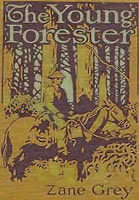 The Young Forester is one of the most simply constructed plots that I've read of Zane Grey's western romance novels. It has also contains something new, though, that adds to its readability: the protagonist wants to enter a career path new to America--that of the forester, of protecting and nurturing the forests rather than clear-cutting them.
The Young Forester is one of the most simply constructed plots that I've read of Zane Grey's western romance novels. It has also contains something new, though, that adds to its readability: the protagonist wants to enter a career path new to America--that of the forester, of protecting and nurturing the forests rather than clear-cutting them.
To see the principles of forestry and environmental protection promoted in a western romance first published in 1910 is an education of both how far our culture has come in caring for our environment, and how far it still has to go.
The tale follows young Ken who charges off from the east (where he does camp, hunt, fish, and enjoy the forests) to the raw wilderness of Arizona. There he meets unscrupulous lumbermen, adventure, and proves that he has, beneath his inexperienced tenderfoot ways, the steel of a man. And the principles of forestry, of course, prevail.
I enjoyed the book and was glad to see that the principles of scientific forestry prevailed in 1910, even if they are still struggling in 2011, one hundred years later.
The Mysterious Rider
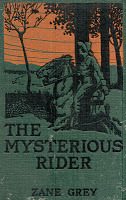 The Mysterious Rider
is a more complex novel about redemption. Still a western romance, the plot centers around a young woman, an orphan named Columbine, who is entrapped by her allegiances into considering marriage to the drunkard son of her adopted father.
The Mysterious Rider
is a more complex novel about redemption. Still a western romance, the plot centers around a young woman, an orphan named Columbine, who is entrapped by her allegiances into considering marriage to the drunkard son of her adopted father.
"Hell Bent Wade" is the mysterious rider, a man with a veiled past who has spent his life helping others--usually with the business end of his pistol, to the detriment of the evil-doers.
The novel is more complex in its conflicts, though, than many of Grey's romances. Rancher Bill Belllounds is a good man who is blinded by his love for his son. Hell Bent Wade is a good man who has done bad things. Columbine is a good young woman who is conflicted between her needs and the needs of her adoptive father. Jack Belllounds is the weak son who is hot and cold on morality. The love interest, Wilson Moore, loves as only a cowboy can--silently worshipping the rancher's daughter.
If I didn't have faith that Zane Grey would work everything out in the end, I'd fear that the realists or naturalists would prevail and everything would go to hell in the end--death, grief and suffering, and waste of life. However, Grey believes in the hero, and in the end like Beowulf meeting Grendel, the warrior comes to the aid of the people.
A Note About Zane Grey:
Zane Grey wrote his stories for the people who bought them. White, Anglo-Saxon Protestants, preferably male, are the protagonists. Woman are bosom-clutching individuals, more emotionally fragile than men--strong but only in their own female way. Racial and ethnic minorities are of lesser stature than the WASP main characters. Grey's romanticized vision of the wild west, unfortunately, did not include the visionary equality of gender, race, or cultural diversity. He was a man of his times--and those times had their issues.
I have written earlier of Zane Grey that I have a love/hate relationship with his writing. I choose to accept, understand, and forgive--something he and many of his time were not able to do.
At Project Gutenberg, these two novels are also available as free ebooks in a variety of formats.
 The Young Forester is one of the most simply constructed plots that I've read of Zane Grey's western romance novels. It has also contains something new, though, that adds to its readability: the protagonist wants to enter a career path new to America--that of the forester, of protecting and nurturing the forests rather than clear-cutting them.
The Young Forester is one of the most simply constructed plots that I've read of Zane Grey's western romance novels. It has also contains something new, though, that adds to its readability: the protagonist wants to enter a career path new to America--that of the forester, of protecting and nurturing the forests rather than clear-cutting them.To see the principles of forestry and environmental protection promoted in a western romance first published in 1910 is an education of both how far our culture has come in caring for our environment, and how far it still has to go.
"[Lumbermen] are in such a hurry to get rich that they'll leave their grandchildren a desert. They cut and slash in every direction, and then fires come and the country is ruined. Our rivers depend upon the forests for water. The trees draw the rain; the leaves break it up and let it fall in mists and drippings; it seeps into the ground, and is held by roots. If the trees are destroyed the rain rushes off on the surface and floods the rivers. The forests store up water, and they do good in other ways."The novel, though, is not a lecture on principles of forestry.
The tale follows young Ken who charges off from the east (where he does camp, hunt, fish, and enjoy the forests) to the raw wilderness of Arizona. There he meets unscrupulous lumbermen, adventure, and proves that he has, beneath his inexperienced tenderfoot ways, the steel of a man. And the principles of forestry, of course, prevail.
I enjoyed the book and was glad to see that the principles of scientific forestry prevailed in 1910, even if they are still struggling in 2011, one hundred years later.
The Mysterious Rider
 The Mysterious Rider
is a more complex novel about redemption. Still a western romance, the plot centers around a young woman, an orphan named Columbine, who is entrapped by her allegiances into considering marriage to the drunkard son of her adopted father.
The Mysterious Rider
is a more complex novel about redemption. Still a western romance, the plot centers around a young woman, an orphan named Columbine, who is entrapped by her allegiances into considering marriage to the drunkard son of her adopted father."Hell Bent Wade" is the mysterious rider, a man with a veiled past who has spent his life helping others--usually with the business end of his pistol, to the detriment of the evil-doers.
The novel is more complex in its conflicts, though, than many of Grey's romances. Rancher Bill Belllounds is a good man who is blinded by his love for his son. Hell Bent Wade is a good man who has done bad things. Columbine is a good young woman who is conflicted between her needs and the needs of her adoptive father. Jack Belllounds is the weak son who is hot and cold on morality. The love interest, Wilson Moore, loves as only a cowboy can--silently worshipping the rancher's daughter.
If I didn't have faith that Zane Grey would work everything out in the end, I'd fear that the realists or naturalists would prevail and everything would go to hell in the end--death, grief and suffering, and waste of life. However, Grey believes in the hero, and in the end like Beowulf meeting Grendel, the warrior comes to the aid of the people.
A Note About Zane Grey:
Zane Grey wrote his stories for the people who bought them. White, Anglo-Saxon Protestants, preferably male, are the protagonists. Woman are bosom-clutching individuals, more emotionally fragile than men--strong but only in their own female way. Racial and ethnic minorities are of lesser stature than the WASP main characters. Grey's romanticized vision of the wild west, unfortunately, did not include the visionary equality of gender, race, or cultural diversity. He was a man of his times--and those times had their issues.
I have written earlier of Zane Grey that I have a love/hate relationship with his writing. I choose to accept, understand, and forgive--something he and many of his time were not able to do.
At Project Gutenberg, these two novels are also available as free ebooks in a variety of formats.
Published on October 25, 2011 05:00
October 22, 2011
Giving Away Books: independent-publishing bliss
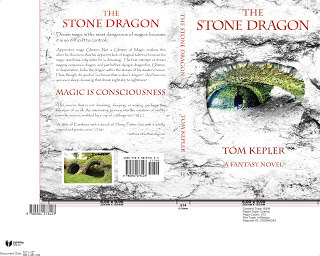
Now that my new fantasy novel, The Stone Dragon, is published and available through Amazon (paper and Kindle), Barnes and Noble (paper and Nook), and Smashwords (many ebook formats), I can move to marketing. And the first and best part? Giving away books.
First, the gifts go to those who helped the book become a published reality--love and support, ideas, editing, technical support.Next, to family and my "book-loving" communityFinally, "soft-marketing" to those who are involved in the book industry or who have contacts with the book or media entertainment industry.This isn't just a bibliophile's love-fest. Books cost money to create, publish, print, and ship. In all honesty, though, part of the strategy has to be celebration, the celebration and recognition of the fulfillment of completing the process of making the dream tangible.
Today I gave some books away--some of them to people who weren't expecting them. To hear their oooh's and aaah's was a joy, especially since they were sincere and not just polite noises (at least I choose to view it that way).
Now comes the more strenuous part--the actual marketing to the online readers and reviewers. I have no doubt I'll receive more oooh's and aaah's--along with some catcalls and raspberries. It takes all kinds, and I'll try to be kind to them all.
Copyright 2011 by Thomas L. Kepler, all rights reserved
Published on October 22, 2011 13:12
October 15, 2011
The Key to Life: Consciousness, the Laws of Nature, and "Consciousness-based" Magic
[image error]
How's that for a title?
It was lunch, and I was faithfully fulfilling my teacher lunch duties outside by supervising the students. It was windy and a bit chilly. I gave a trustworthy 7th grader (Yes, they do exist!) my key and asked him to get my jacket. He came back with the jacket but said the key was stuck in the lock.
After lunch I returned to my room and removed the key. No problem. Now, why was that? I was familiar with the locking mechanism, having unlocked the door many, many times. I was familiar with locks and keys in general--at least more so than my twelve-year-old helper. I was patient and persistent, not a quality youngsters are always noted for, especially when they are eager to return to the playground.
This is how we live our lives. We experience, learn, expand our territory of influence, become proficient. And this is true for both outer and inner experience. Daniel Boone said he had never been lost but was once "a mite confused" . . . for several days or weeks, depending on who's telling the story.
Knowledge and experience bring contentment, bring confidence and competence. We learn through doing but often can only do according to our level of knowledge and experience.
Because I practice the Transcendental Meditation program, I am experienced with the silent depths of the mind, like the waves of the ocean settling. I'm not going to make any claims as to what that means for my experience. (Probably false advertising--after all, writers make stuff up.) You can look at the scientific research if you like. However, I believe there is a unity to existence; there is a Unified Field. Even physics tells us that, so there must be a connection to inner quietness and the quiet depths of the physical world. Perhaps that is a great leap, but my experience tells me that it is so; my intuition feels there is a connectedness of experience.
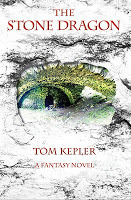 This applies to my writing of fantasy fiction, of writing consciousness-based fantasy or consciousness-based magic. This is the approach to writing fantasy that I used in The Stone Dragon and am continuing with the other novels of the series.
This applies to my writing of fantasy fiction, of writing consciousness-based fantasy or consciousness-based magic. This is the approach to writing fantasy that I used in The Stone Dragon and am continuing with the other novels of the series.
What if, just as one can be familiar with keys and locking mechanisms, one can also be familiar with the mechanics of the structure of existence, one can know the order and intelligence of existence from the direct experience of the fundamental nature of one's own creative intelligence.
These are some of the ideas I'm exploring in my fantasy writing: not artifact-based magic or spell-based magic but consciousness-based magic. We structure our own reality. The world is as we are. Knowledge is structured in consciousness.
To be good writers, we are supposed to write from our experience. How ironic that the action of my novels is based on non-action, or silence in motion.
It's a dark and stormy night . . . I guess I just start with is and take it from there.
Copyright 2011 by Thomas L. Kepler, all rights reserved
It was lunch, and I was faithfully fulfilling my teacher lunch duties outside by supervising the students. It was windy and a bit chilly. I gave a trustworthy 7th grader (Yes, they do exist!) my key and asked him to get my jacket. He came back with the jacket but said the key was stuck in the lock.
After lunch I returned to my room and removed the key. No problem. Now, why was that? I was familiar with the locking mechanism, having unlocked the door many, many times. I was familiar with locks and keys in general--at least more so than my twelve-year-old helper. I was patient and persistent, not a quality youngsters are always noted for, especially when they are eager to return to the playground.
This is how we live our lives. We experience, learn, expand our territory of influence, become proficient. And this is true for both outer and inner experience. Daniel Boone said he had never been lost but was once "a mite confused" . . . for several days or weeks, depending on who's telling the story.
Knowledge and experience bring contentment, bring confidence and competence. We learn through doing but often can only do according to our level of knowledge and experience.
Because I practice the Transcendental Meditation program, I am experienced with the silent depths of the mind, like the waves of the ocean settling. I'm not going to make any claims as to what that means for my experience. (Probably false advertising--after all, writers make stuff up.) You can look at the scientific research if you like. However, I believe there is a unity to existence; there is a Unified Field. Even physics tells us that, so there must be a connection to inner quietness and the quiet depths of the physical world. Perhaps that is a great leap, but my experience tells me that it is so; my intuition feels there is a connectedness of experience.
 This applies to my writing of fantasy fiction, of writing consciousness-based fantasy or consciousness-based magic. This is the approach to writing fantasy that I used in The Stone Dragon and am continuing with the other novels of the series.
This applies to my writing of fantasy fiction, of writing consciousness-based fantasy or consciousness-based magic. This is the approach to writing fantasy that I used in The Stone Dragon and am continuing with the other novels of the series.What if, just as one can be familiar with keys and locking mechanisms, one can also be familiar with the mechanics of the structure of existence, one can know the order and intelligence of existence from the direct experience of the fundamental nature of one's own creative intelligence.
These are some of the ideas I'm exploring in my fantasy writing: not artifact-based magic or spell-based magic but consciousness-based magic. We structure our own reality. The world is as we are. Knowledge is structured in consciousness.
To be good writers, we are supposed to write from our experience. How ironic that the action of my novels is based on non-action, or silence in motion.
It's a dark and stormy night . . . I guess I just start with is and take it from there.
Copyright 2011 by Thomas L. Kepler, all rights reserved
Published on October 15, 2011 12:15
October 9, 2011
National Novel Writing Month: November 1-30
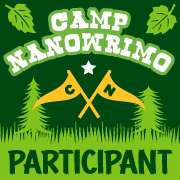 http://www.nanowrimo.org/NaNoWriMo: National Novel Writing Month: 50,000 words
http://www.nanowrimo.org/NaNoWriMo: National Novel Writing Month: 50,000 words NaNoWriMo Young Writers Program: set your own goal
I've never seriously considered "going for it" because I have a life outside writing--but I'd like to. And maybe I will, and I'll keep it secret. I won't even tell you.
People will say, "Where's Tom? He's here at work, and then he just disappears. What's that all about?" Meanwhile, I'll be off somewhere with my mini netbook or with my flashdrive pouncing on available computers: guerrilla time management.
National Novel Writing Month is a fun, seat-of-your-pants approach to novel writing. Participants begin writing on November 1. The goal is to write a 50,000 word, (approximately 175 page) novel by 11:59:59, November 30.
 http://ywp.nanowrimo.org/Last year more than 200,000 individuals signed up for the event, and more than 30,000 ended the month with a 50K draft of a novel. The spirit of the event seems to be to get the words on the page (or file), and then you can lean back and enjoy the moment--you've just completed the first draft of a really bad novel. That's where all novelists start, anyway, with a sloppy copy.
http://ywp.nanowrimo.org/Last year more than 200,000 individuals signed up for the event, and more than 30,000 ended the month with a 50K draft of a novel. The spirit of the event seems to be to get the words on the page (or file), and then you can lean back and enjoy the moment--you've just completed the first draft of a really bad novel. That's where all novelists start, anyway, with a sloppy copy.The Basic Information
What: Writing one 50,000-word novel from scratch in a month's time.It's a nice idea. It's a wonderful dream. Is it a goal? I'm not telling!
Who: You! We can't do this unless we have some other people trying it as well. Let's write laughably awful yet lengthy prose together.
Why: The reasons are endless! To actively participate in one of our era's most enchanting art forms! To write without having to obsess over quality. To be able to make obscure references to passages from our novels at parties. To be able to mock real novelists who dawdle on and on, taking far longer than 30 days to produce their work.
When: You can sign up anytime to add your name to the roster and browse the forums. Writing begins 12:00:01 November 1. To be added to the official list of winners, you must reach the 50,000-word mark by November 30 at 11:59:59. Once your novel has been verified by our web-based team of robotic word counters, the partying begins.
Still confused? Just visit the How NaNoWriMo Works page!
Copyright 2011 by Thomas L. Kepler, all rights reserved
Published on October 09, 2011 04:21
October 6, 2011
Apocalyptic Jack London: The Scarlet Plague, a review
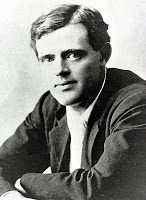 "All things pass. Only remain cosmic force and matter, ever in flux, ever acting and reacting and realizing the eternal types--the priest, the soldier, and the king. Out of the mouths of babes comes the wisdom of all the ages. Some will fight, some will rule, some will pray; and all the rest will toil and suffer sore while on their bleeding carcasses is reared again, and yet again, without end, the amazing beauty and surpassing wonder of the civilized state."
"All things pass. Only remain cosmic force and matter, ever in flux, ever acting and reacting and realizing the eternal types--the priest, the soldier, and the king. Out of the mouths of babes comes the wisdom of all the ages. Some will fight, some will rule, some will pray; and all the rest will toil and suffer sore while on their bleeding carcasses is reared again, and yet again, without end, the amazing beauty and surpassing wonder of the civilized state."Jack London's short novel The Scarlet Plague is a narrative of the last man alive who had lived prior to the apocalyptic plague that swept the earth in 2012, "Granser," who tells the young men the story of what life was like prior to the death and devastation. The 2012 setting was London's vision of 100 years later than the book originally was published.
And the three young men who take care of him--teasing Granser, feeding him lobster and oysters--hoot and disbelieve his story. Granser--the grandfather of the young men--continues to tell the story because he knows he is old and will die in the not-too-distant future.
Edwin, Hare-Lip, and Hoo-Hoo are those who will inherit the earth: king, soldier, and priest.
As a socialist during his life, Jack London wrote many books about the need and right of the common person to have the freedom to live life with dignity. See The Iron Heel , for instance, with its protagonist Ernest Everhard.
It's not clear to me what is London's angle for this story. The old man lists the virtues and wonders of the ancient technological world of 2012 (with London's estimated population of 8 billion). Granser tells of the breakdown of social structure during the plague's killing time. And London characterizes the three young men as ignorant, clever, and ambitious.
Perhaps London's message is "What goes around comes around." That seems to be the crux of the quotation that begins this review: the cosmic flux. Whatever was London's political agenda, the novel reads with humor, suspense, and pathos.
As always, in this novel, London is humanity's writer--a man who sees humanity and describes what he sees--warts, lice, and all.
I read this book in the free ebook edition:
The Scarlet Plague
Project Gutenberg
Published on October 06, 2011 03:52
October 4, 2011
Maharishi School: Video of Middle School Project-based Activity--Egg-Drop & Gallon Water-Drop
 Reported by Gabe S. and Marcus S.
Reported by Gabe S. and Marcus S.The objective of the project was to design an apparatus that will protect a free-falling 1 gallon plastic jug of water or an egg in a bag dropped from a second floor window that hits the ground.
The requirements and constraints of this project are the following: The apparatus must fit through the window.The water jug or egg will be included in weight of the apparatus.The apparatus may not weigh more than 35 kilograms or 500 gramsThe goal of this project was to learn how to do projects, meaning managing time, getting work done, and testing tolerance of your apparatus.
Copyright 2011 by Thomas L. Kepler, all rights reserved
Published on October 04, 2011 13:12
October 2, 2011
The Stone Dragon To Be Published in October
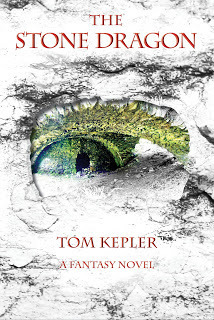 It's been about two weeks since I've last posted--the longest I've gone in the almost two and a half years I've been writing this blog: time well spent, though!
It's been about two weeks since I've last posted--the longest I've gone in the almost two and a half years I've been writing this blog: time well spent, though!Here is the current skinny on The Stone Dragon , my soon-to-be available fantasy novel.
finished with the second proof of the novel--cover image tweaked and a few small adjustments to the book interiormetadata (info to Lightning Source, the printer/distributor about the book) adjusted, so the title can be accepted for printing and uploading to Amazon and Barnes & Noble this next weekbooks ordered by me for marketing next weekSmashwords ebook tweaked to fix the minor errors found in the book proof--the book is now in their Premium Catalog and distributed to Apple, Barnes & Noble, Sony, Kobo, the Diesel eBook Store, and moreworking on the Kindle version--should have it up in a weekupdating online connections: Goodreads, Facebook, LinkedIn, Twitter, Bloggerconsidering the timeline for a virtual book touridentifying sources for information about a PayPal "buy" button for the novel's pageThose of you who know how--be sure to remember the "share" and "tweet" buttons! And, of course, email, the grandparent of virtual information exchange.
Copyright 2011 by Thomas L. Kepler, all rights reserved
Published on October 02, 2011 03:57



